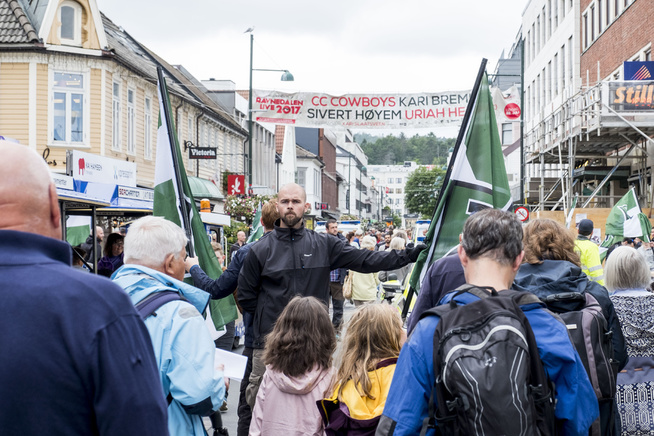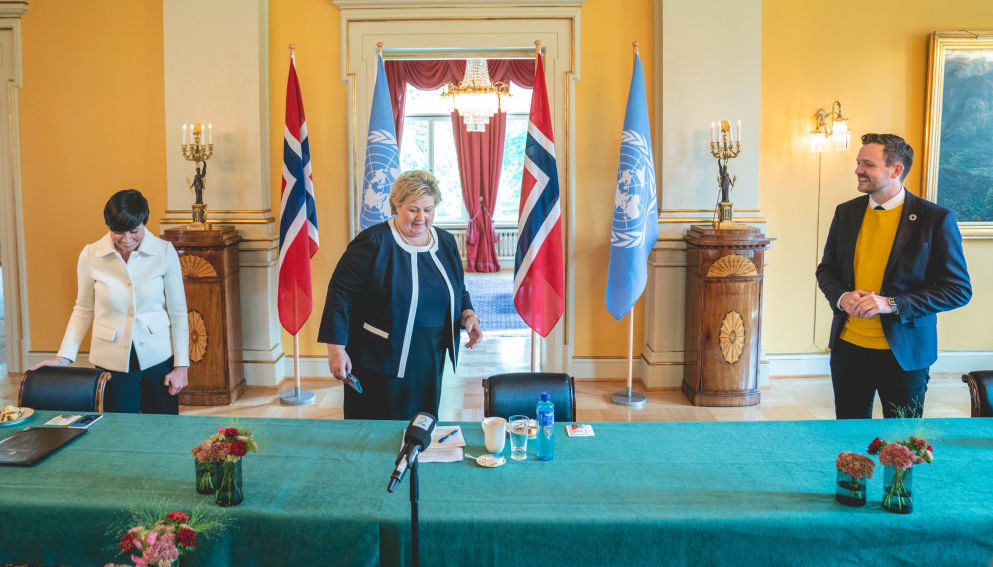Photo: Tor Erik Schrøder, NTB SCANPIX
Mette Wiggen, University of Leeds
A legitimization of radical right-wing ideology is taking place around the world. The world was shocked by the events in Charlottesville, America, and by Donald Trump’s failure to condemn racist violence. But it may be even more surprising to some to learn that the radical right has achieved a mainstream foothold in Scandinavia and that right-wing parties and groups have been accepted as legitimate and part of the mainstream.
Scandinavian society is increasingly adopting an anti-immigrant agenda which has led to the strictest immigration legislation in Europe.
Ideas based on “welfare chauvinism” – the notion that welfare benefits should be restricted to the “natives” of a country as opposed to “less deserving” immigrants – are gaining support. And the economic argument against accepting asylum seekers is now getting traction in the mainstream political debate in most of Europe. Yet it is not clear why this is the case, as the effects of austerity policies have been less harsh in Scandinavia than elsewhere on the continent and levels of poverty is much lower.
Support for anti-immigrant radical right-wing parties is especially high among unemployed and retired men. But in the last decade, it has become increasingly diverse. Mainstream media, think-tanks, and political parties are legitimising the radical right by adopting their rhetoric and letting them set the agenda on immigration, integration and values.
A radical right-wing Swedish newspaper, Nya Tider, has been granted access to Scandinavia’s largest book fair in Sweden this autumn. The announcement of this has led to a boycott by several authors, including the leading Kenyan writer, Ngugi wa Thiong’o.
The openly Nazi and anti-Semitic Nordic Resistance Movement (NRM) is active in all Scandinavian countries and took part in Almedalsveckan, Sweden, in July – an annual forum for political debate. Almedalsveckan is a week when the most prominent politicians, civil society organisations, and the media meet to discuss contemporary politics and society in Almedal in Gothenburg.
The leader of Almedalsveckan, Mia Sture, said the Nazis could not be excluded because they were registered as a political party. The same group staged an illegal march in Kristiansand, Norway, in July where the police arrived to protect them. They were refused participation in Arendalsuka which is the Norwegian equivalent to Almedalsveckan. The equally radical SIAN participated in Arendal but were asked to leave on the third day due to fighting.
The mainstream itself legitimises the extreme – and in Norway, the minister for migration and integration Sylvi Listhaug (Progress Party) encouraged fellow citizens to be vigilant and report refugees who visit their country of origin. She also warned against “Swedish conditions” referring to gang violence in Sweden.
Meanwhile, the hottest topic during the summer’s national election campaign is protecting “Norwegian values”. It is unclear what the values are and different commentators highlight anything from eating waffles and taking communal showers to openness and democracy whilst minorities – especially Muslims – feel targeted.
Fascist roots and immigration
In Sweden, the Sweden Democrats (SD) is the second-biggest party in the polls, despite its fascist roots. Parties such as the SD owe their success largely to their stance on immigration. Some argue that their sudden popularity must be linked to Sweden being the most generous EU country on asylum.
The Danish and Norwegian parties are more established and more professional than most of their European sister parties and have long been accepted by mainstream political parties. They have always had plenty of attention from the media. They talk about “Eurabia” – the idea that Europe is facing a threat from Islam and an invasion of Muslims.
They have monopolized universal liberal values as their own and link gay rights as well as women’s right to national values and culture, arguing that this is incompatible with immigrant culture.
The welfare state and a call for limited access to welfare for immigrants is prominent in their programs where they link cut backs and welfare retrenchment to immigration.
The radical right has been successful in blaming austerity policies on high birth rates among immigrants and comes across as strong defenders of a new dualistic welfare state, where white naturalized citizens should have preferential treatment.
Around 34 per cent of the general public in Norway perceive immigrants as a cultural and economic threat due to limited resources. In Denmark in 2016, as numbers of refugees escalated, the government started confiscating refugees’ assets and valuables with broad support from the mainstream parties. This was received with incredulity across the world. Parallels were drawn to Nazi Germany – but in Denmark, even social democrats maintained that this was fair as refugees should contribute to cover the cost of their housing and subsistence.
It is a common belief that asylum seekers arrive to exploit the welfare state and negative reporting on issues related to immigrants is the norm. In 2011 the EU commission issued a warning against the Norwegian press due to negative reporting about Muslims, but little seems to have changed.
![]() Xenophobia, racism, and welfare chauvinism have gone mainstream in Scandinavia. It is coming from the top and being protected in the name of freedom of speech. Rather than facing up to the largest refugee crisis since World War II, mainstream politicians in wealthy Scandinavia are instead pandering to the radical right’s greed and fear.
Xenophobia, racism, and welfare chauvinism have gone mainstream in Scandinavia. It is coming from the top and being protected in the name of freedom of speech. Rather than facing up to the largest refugee crisis since World War II, mainstream politicians in wealthy Scandinavia are instead pandering to the radical right’s greed and fear.
Mette Wiggen, Lecturer, University of Leeds
This article was originally published on The Conversation. Read the original article.




